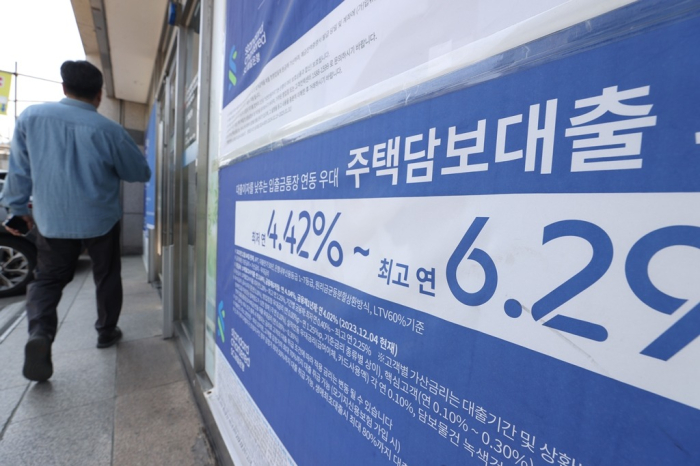Economy
Korea’s household debt growth at 5-month high on mortgages
Corporate lending increased by the most in six months as loan demand grew amid a lack of funds, some invested more
By May 13, 2024 (Gmt+09:00)
2
Min read
Most Read
Samsung steps up AR race with advanced microdisplay for smart glasses


When in S. Korea, it’s a ritual: Foreigners make stops at CU, GS25, 7-Eleven


Maybe Happy Ending: A robot love story that rewrote Broadway playbook


NPS yet to schedule external manager selection; PE firms’ fundraising woes deepen


US auto parts tariffs take effect; Korea avoids heavy hit



South Korea’s household lending growth hit a five-month high in April as mortgage loans increased amid signs of a recovery in the property market, reigniting concerns that the rising consumer debt may derail Asia’s fourth-largest economy.
The outstanding balance of household loans at banks grew 5.1 trillion won ($3.7 billion) to 1,103.6 trillion won as of end-April from a month earlier, according to Bank of Korea (BOK) data released on Monday. The monthly increase was the largest since November 2023.
Mortgage loans at banks rose 4.5 trillion won, while other types of credit climbed 600 billion won, marking the first increase in six months.
In March, household lending fell 1.7 trillion won with mortgage loans up only 500 billion won.
“The increasing home transactions may have affected mortgage loans,” a senior BOK official said.
South Korea’s apartment transactions have been recovering with some 39,000 units traded in March, up from 30,000 units in February, 31,000 units in January and 24,000 units in December 2023, according to the central bank.
AUTHORITIES TO STEM DEBT GROWTH
Financial regulators vowed to take measures to refrain household lending from sharply increasing after their separate data showed consumer credit at all financial institutions including banks, saving banks, insurers and others increased by a six-month high of 4.1 trillion won, made up mostly of mortgage loans, last month.
“The authorities plan to make policy efforts to keep household lending within GDP growth as it cannot be ruled out for household loan growth to expand further due to the sustained rate cut expectations and housing market recovery,” the Financial Services Commission and the Financial Supervisory Service said in a joint statement.
BOK Governor Rhee Chang-yong has repeatedly pledged to reduce household debt without causing a severe economic downturn.

CORPORATE LENDING GROWTH AT SIX-MONTH HIGH
Corporate lending of banks rose 11.9 trillion won last month, the largest since October 2023, to a record high of 1,284.6 trillion won as of end-April, the BOK said.
Loans to large companies increased by 6.5 trillion won, while lending to small and medium-sized enterprises rose by 5.4 trillion won.
“Demand for corporate loans increased despite the improving business conditions in the first quarter,” the BOK official said. “Some large companies continued to seek funds for facilities.”
Beneficiaries of the better business conditions raised investments, while companies continued to suffer a lack of funds, analysts said.
Some companies sought money for dividend payments in April and others looked for loans again after repaying debts at the end of March to enhance quarterly financial reports, they added.
Write to Jin-gyu Kang at josep@hankyung.com
Jongwoo Cheon edited this article.
More to Read
-
 EconomyBOK's rate policy back to square one after GDP, Fed comments
EconomyBOK's rate policy back to square one after GDP, Fed commentsMay 03, 2024 (Gmt+09:00)
3 Min read -
 EconomyKorea’s household, business loans on upswing in September
EconomyKorea’s household, business loans on upswing in SeptemberOct 12, 2023 (Gmt+09:00)
2 Min read -
 Central bankBOK chief’s top mission: Soft landing for household debt
Central bankBOK chief’s top mission: Soft landing for household debtAug 24, 2023 (Gmt+09:00)
2 Min read -
 Central bankBOK warns of household lending risk on growth, inequality
Central bankBOK warns of household lending risk on growth, inequalityJul 17, 2023 (Gmt+09:00)
3 Min read
Comment 0
LOG IN


